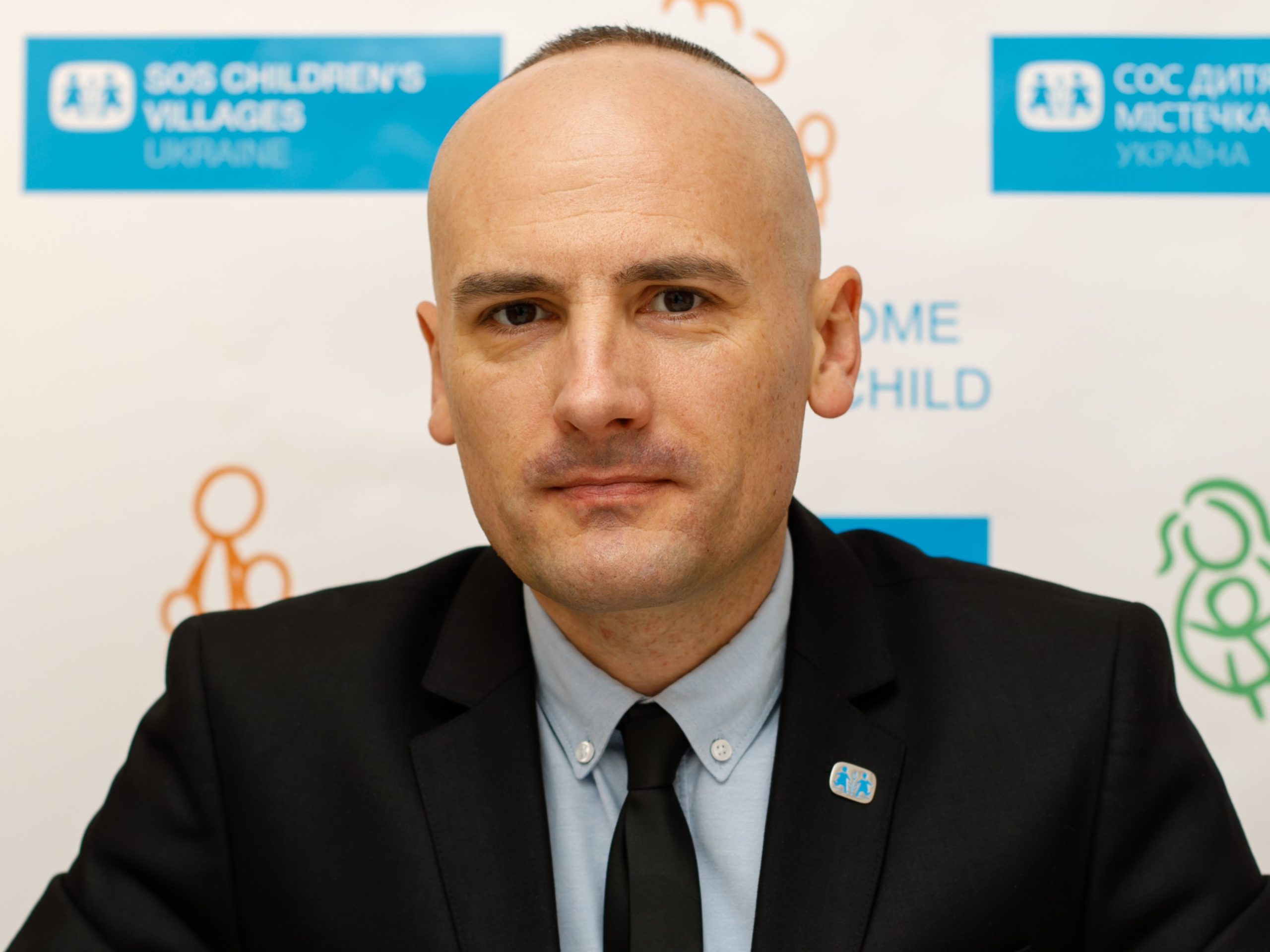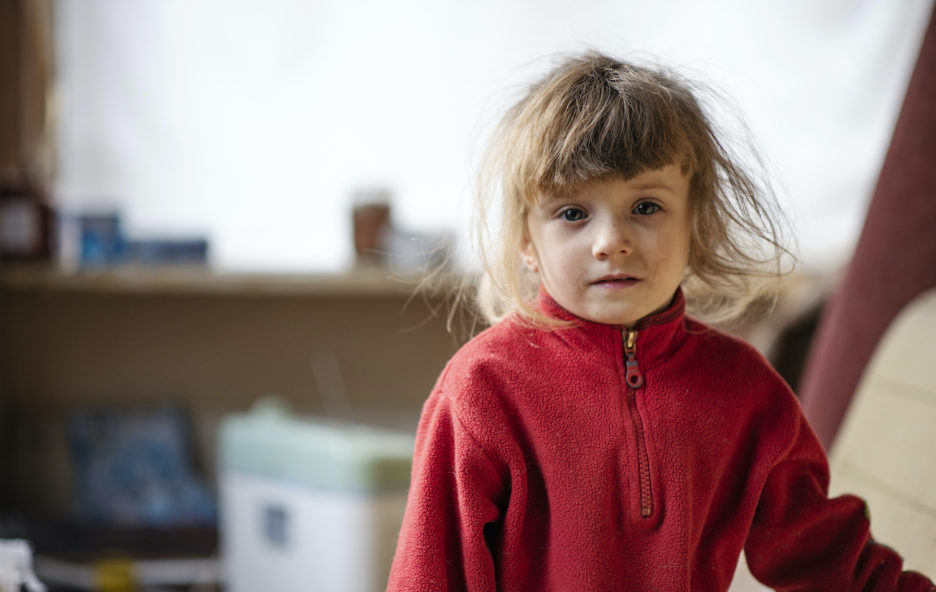“We will keep helping children”
Mr Serhii Lukashov has been the National Director of SOS Children’s Villages Ukraine since 2019. Here he speaks about the current situation in Ukraine and how it affects the work of the programmes of SOS Children’s Villages in the country.
The de-escalation of fighting of the past few years brought hope to many people in Luhansk. Now, an escalation of the war, called imminent by Western media, threatens to further endanger the livelihoods of millions of people in the region. What are the reactions of the people in Luhansk region? How are they handling the tensions?
It is actually a strange situation. People tend to ignore the danger. People tend to continue life as usual. We don’t see panic and that’s good thing. Most people decide to just continue as usual and plan to stay. We are monitoring the situation and regularly communicating with our communities, with the SOS foster families whom we support and with the employees who are living there with their own families. They don’t plan to move out in advance. We have applied some emergency preparedness measures. We’ve secured food packages for each foster family and for the families of our employees in case an emergency happens abruptly and they would not be able to move out, which is a risk. So this way, they would be able to stay home for many days with food and water until the situation calms. [After that] they would most probably relocate. We know this from the previous experience. We can only guess that the non-government-controlled territory is most probably going to be economically very bad. It is difficult in the government-controlled territory, but much more difficult in the non-government-controlled territory.
This is why people plan to move out but only after an emergency really happens, not in advance.
Was there an increase in the demand for our services both by current beneficiaries, but also potential new ones?
I wouldn’t say that there was a dramatic increase. We told all our foster families that if they have any needs, including the need for education, to let us know. We will plan such services. On our side we increased our offer but we didn’t notice the increased demand for services. At the moment it is pretty usual. But, you have to understand that in Luhansk region people are living in this state for quite a long time, and in time it’s getting worse. More shooting, more shelling, more rumours, more anxiety. People take it with some filter. “OK, that’s bad, we don’t want it, but we are not panicking. We used to panic in 2014 when it just began.” It’s not good because it might mean it’s emotional exhaustion. But, people are not panicking anymore.
Following the start of the Donbas War in 2014, thousands of people fled the Donetsk and Luhansk regions in search of safety and a better life. In case of a similar scenario, would Ukrainian society be able to cope with such situation?
During the first stage of the conflict, in 2014, 2015 and 2016, I can say that we as Ukrainian society and we as SOS Ukraine could really be proud of ourselves. We pretty much adapted and integrated the internally displaced people (IDP), 1.2 million people. This is a big number for a country of 40 million. We don’t have camps, we don’t have ghettos. We don’t have children of IDPs in institutions. Most of them are pretty well reintegrated in which SOS played a role. The first intervention that would be needed is emotional, pedagogical and psychosocial support, integration of children, trauma relief, help people with acute trauma during the first months. This is what we have prepared for. Fortunately, in Kyiv and Brovary we have facilities for that. We have premises and staff who can do that. What will be worse, much worse is if Kyiv would be affected. We would have to evacuate children and families from Kyiv which would be a problem. But, we prepared ourselves by making a preliminary agreement with our partners in the western part of the country. They would help us with new accommodation for the foster families. We plan to relocate and restart our work in a new place. And for this we really need money. We will need additional funds to rent premises, to buy equipment because we won’t be able to move all or it and we will need psychological and pedagogical equipment. We hope this won’t happen. But, if it will, we will start anew and we will work with the same category – we will work with children who will be evacuated.
The current uncertainties affect the entire country. How are our co-workers in Kyiv and Brovary coping with the tension?
There was a lot of anxiety at the beginning of this last crisis in October-November when first information came that an invasion may happen. I wouldn’t say there was fear or panic. Though we were proposing to people to move out, relocate, take weeks off if they were worried. But, nobody left their job. They continued to work. Myself and the management held meetings, physically and virtually. What people needed to hear, and when they heard they got relieved, was that the organization will stay and will continue its functions. We said whatever the crisis will be, we will relocate, we will reorganise, we will restructure the budget, but we will continue doing our services. You all will keep your job and we will keep doing what we are doing now. We will be helping children.
And that was a big relief for the staff. I got much feedback that this is what they wanted to hear. This is what gives them confidence and it helps to go through the crisis.
Any message you would like to send to the SOS co-workers all around the world?
In our daily work we are busy with working at grassroot level. We sometimes forget that we are part of the big, big federation.
But, in crisis moments you realise that you are part of the big family and you and I understand how much it matters, how much more confident we are, how much more stable we are.
We are in a much more privileged situation than our colleagues from local social services from small organizations. We have to value and appreciate this being part of a big family, of a big system, of a big federation. That’s very important. The international solidarity of people, who care for you, who support you – that’s really important. So, thanks to everyone who cares. Thanks to everyone who supports us.
Background:
- The war in eastern Ukraine started in the spring of 2014. Following many months of heavy fighting and over 14.000 deaths, the southern parts of the Donetsk and Luhansk regions proclaimed independence. Soon afterwards, the situation seemingly, but not entirely calmed.
- Ever since then, 2.9 million people continue to lead lives of a pretended normality where a simple travel to school or to work or to a doctor’s appointment is major financial, logistical and nerve-racking nightmare.
- The children of Donbas have anything but a normal childhood. Many of them do not know what’s it like to live through a day without anxiety, tension and shooting.
- As it is frequently reported, life in Donbas might get worse.
Work of SOS Children’s Villages in Ukraine:
SOS Children’s Villages first came to Ukraine in 2003 when a family strengthening programme was established in the capital of Kyiv. In 2010, the first SOS Children’s Village was opened in the town of Brovary, Kyiv region. SOS Children’s Villages established its work in the city of Luhansk in 2012. Shortly after the Donbas War broke out in 2014, the activities were reorganized and expanded in order to respond to the growing needs of the children and families in the Luhansk region where no sphere of life remained intact.


